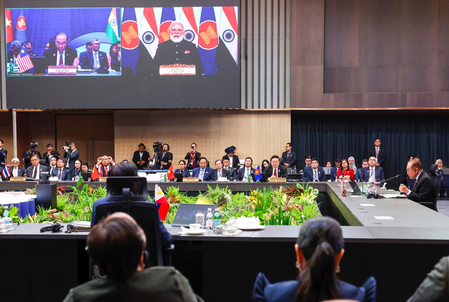

Kuala Lumpur, Oct 28 (IANS) The ASEAN-India Summit provided a platform for Southeast Asian partners — India foremost among them — to contribute actively in building a more multipolar, inclusive, and sustainable regional dynamic, a report stated on Tuesday.
It added that by moving away from unilateralism, the gathering in Kuala Lumpur sent a quiet, yet clear message that the region’s future will be defined by a network of engaged and mutually respectful actors, where collaborative successes outweigh any single protagonist.
“The ASEAN-India Summit in Kuala Lumpur stands as an essential axis in a rapidly changing global order, threading together the interests, challenges, and aspirations of Southeast Asia and its partners amid mounting economic uncertainty and geopolitical flux. With heads of government from across the ASEAN bloc and partner states converging, the summit’s multidimensional agenda—ranging from sustainable tourism to joint maritime exercises—signals a broader intent to secure resilient growth and stability for nearly two billion people,” a report in ‘One World Outlook’ detailed.
According to the report, ASEAN continues to measure its success through pragmatic regionalism. The summit’s adoption of the ASEAN Community Vision 2045, the ASEAN-India Action Plan for 2026–2030, and the Joint Leaders’ Statement on sustainable tourism highlighted the bloc’s ability to evolve beyond mere rhetoric.
The report emphasised that the timing of the summit — coinciding with renewed China-US talks and key side meetings with Japan, Australia, and the EU brings a new dimension to the diplomatic tapestry.
“ASEAN’s balancing act is more than symbolic; it offers smaller economies meaningful agency without polarising the region. While US-ASEAN and China-ASEAN tracks have garnered attention, the deepening ties with India serve as a vital complement, focusing on shared goals like anti-terrorism, infrastructure, and clean energy without overshadowing national priorities,” it stated.
ASEAN’s resilience, the report said, gains further strength from its commitment to inclusivity. The inclusion of Timor-Leste as the 11th member state of ASEAN, continued support for Quick Impact Projects and proposals for regional defence and maritime heritage dialogues reflect the region’s adaptive approach to both competition and cooperation.
“Though not the centrepiece, India’s steady involvement in disaster response, technology, and maritime security enables ASEAN to elevate its own agenda. Training for thousands of professionals in renewable energy, the proposal for a Southeast Asia Centre at Nalanda University, and strengthened cooperation on rare earths and semiconductors lend practical heft to shared ambitions,” the report noted.
–IANS
scor/as
